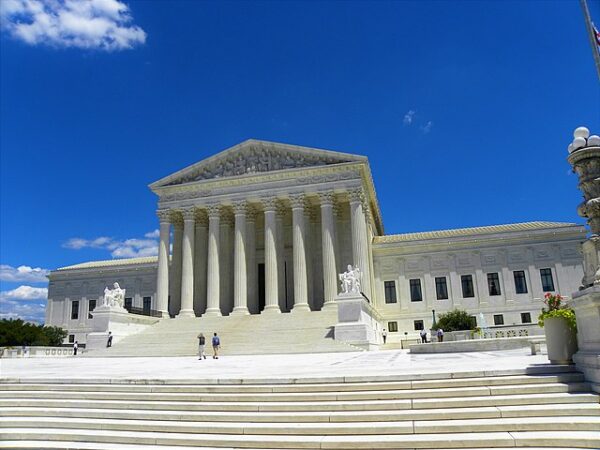On Tuesday, the Supreme Court began hearing arguments in a case that has the potential to dramatically reshape how we experience the internet and think about free speech online.
CNBC reports, “That case is known as Gonzalez v. Google, brought by the family of an American who died in a 2015 terrorist attack in Paris. The petitioners argued that Google and its subsidiary YouTube did not do enough to remove or stop promoting ISIS terrorist videos seeking to recruit members, which they argue is a violation of the Anti-Terrorism Act. In the lower courts, Google won on the basis that Section 230 of the Communications Decency Act shields it from liability for what its users post on its platform.
Now that shield is at stake as the petitioners argue it should not apply where Google actively promotes user-generated content, such as through its recommendation algorithms.
Many lawmakers on both sides of the aisle would likely cheer a narrowing of Section 230, which has been under fire in Washington for years for reasons ranging from the belief it fuels alleged internet censorship to the conviction that it protects tech companies that do little to stop hate speech and misinformation on their platforms.
But tech platforms and many free speech experts warn that changing Section 230 will have broad implications for how the internet operates, incentivizing popular services to limit or slow down user posting to avoid being held liable for what they say.”
Section 230 has received criticism from the last two presidents. The Economist noted that in January, “President Joe Biden took to the op-ed pages of the Wall Street Journal to inveigh against “big-tech abuses” and suggest, among other things, an overhaul of Section 230 of the Communications Decency Act of 1996. Mr. Biden’s predecessor, Donald Trump, was no fan of Section 230 either. In 2020 Mr Trump ordered the Federal Communications Commission (FCC) to confront “online censorship” and consider the law’s role in facilitating it. A flurry of proposals to revise Section 230 have been proposed in Congress but none has come up for a vote in either the House of Representatives or the Senate.
Section 230 was passed nearly 30 years ago, when websites were young and perceived to be vulnerable. The provision ensured that the companies that hosted them would not get bogged down in lawsuits if users posted material to which others might object, such as bad restaurant reviews or complaints about neighbors.”
The Gonzalez case is not the only one the court will be hearing related to Big Tech’s relationship with terrorism. “A day after hearing the Gonzalez v. Google case, the court is scheduled to hear a second tech lawsuit, Twitter v. Taamneh, over whether Twitter has contributed to terrorism,” The New York Times wrote.
The newspaper continued, “What the Supreme Court ultimately decides on the cases will add to a pitched battle around the world over how to regulate online speech. Many governments say that social networks have become fertile ground for hate speech and misinformation. Some have required the platforms to take down those posts. But in the United States, the First Amendment makes it difficult for Congress to do the same.
The Supreme Court case ‘can have an impact on how those companies do business and how we interact with the internet, too,’ said Hany Farid, a professor at the school of information at the University of California, Berkeley. He filed a brief with the Supreme Court supporting the Gonzalez family members who are suing Google.”
You can expect fights over the role that Big Tech and social media giants have over our lives to be a crucial battleground in 2024. Earlier in the month, Republican favorite Governor Ron DeSantis announced “his proposal to protect Floridians’ digital rights and privacy from Big Tech companies. The proposal would create a Digital Bill of Rights focusing on protecting Floridians’ privacy, protecting minors from online predators and eliminating unfair censorship.
Speaking at Palm Beach Atlantic University, DeSantis said the proposal would also ban the use of TikTok and other social media platforms with ties to China from all state government devices, and through internet and WiFi services at colleges, universities, and public schools. In addition, state and local government employees would be prohibited from coordinating with Big Tech companies to censor protected speech.”
“Our Digital Bill of Rights will ensure Floridians are protected from the overreach and surveillance we have seen from Big Tech companies,” said Governor Ron DeSantis. “Today’s proposal builds on our efforts to stop Big Tech censorship and combat the malign influence of China through the removal of nefarious platforms like TikTok from any state-supported activity.”
DeSantis also directed the Department of Management Services (DMS) “to issue a formal recommendation to state agencies to implement all necessary safeguards to block access to applications and software tied to China, including TikTok, WeChat, and QQ, from all state devices. DMS will also prevent network connections to servers associated with foreign countries of concern.”
[Read More: United Airlines Looks To Help Traveling Families, Shake Up Industry]



